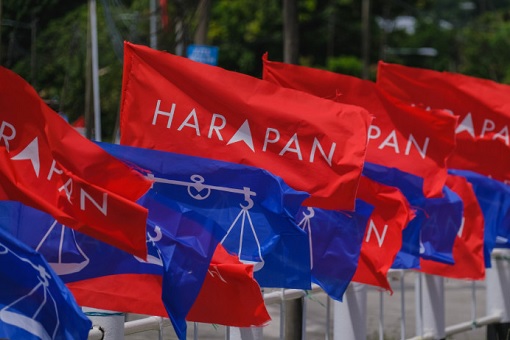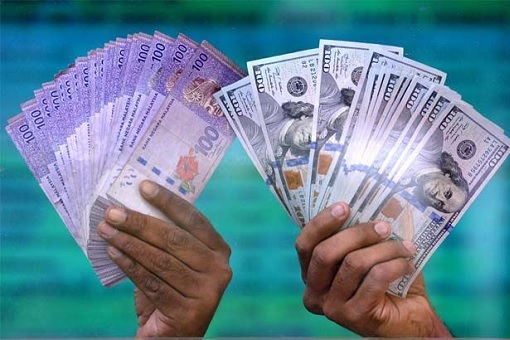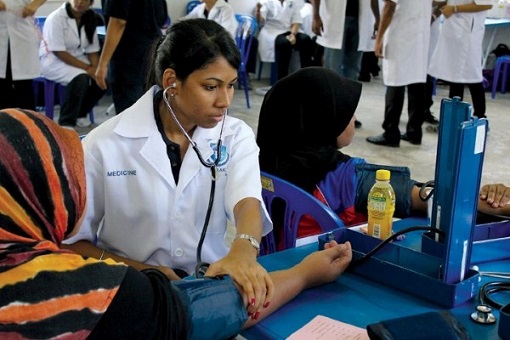
Economy & Cost Of Living – Unity Govt Should Learn From Democrats’ Losses, And Reconnect With Average People
November 21st, 2024 by financetwitter
In denial that his government is fast losing the perception war, Anwar Ibrahim still hopes he can continue to be the prime minister after the next 16th General Election. He should be grateful that his current term has outlived his three predecessors – Mahathir Mohamad (22 months), Muhyiddin Yassin (17 months), and Ismail Sabri (15 months). However, his 24-month milestone is just the beginning.
Even if PM Anwar could successfully sail through the thunderstorm of the remaining 3 years by surrendering to whatever demands made by ally UMNO (including freeing crooked Najib Razak), there’s no guarantee he can become the prime minister. For example, he might lose his parliament seat, or his People’s Justice Party (PKR) might lose big in the next election.
While it’s absolutely possible that Anwar-led Pakatan Harapan coalition and UMNO-led Barisan Nasional could continue to work together in the 16th General Election to prevent 3-cornered contests, which would benefit opposition Perikatan Nasional, it’s also possible that the United Malays National Organization (UMNO) will demand the Iron Throne if it performs better than PKR.

Do you really think the greedy UMNO leadership will continue to play second fiddle if Barisan Nasional increases its current 30 seats to 40, while PKR manages to secure only 20 out of current 30 seats? Anwar’s strategy of appeasing rival-turned-ally UMNO, whilst at the same time ignoring power base Democratic Action Party (DAP) to fend for itself, will come back to haunt him. But that’s another article for another day.
At the end of the day, voters will judge Anwar based on the economy, specifically the cost of living. He can brag about his leadership, even self-proclaiming as the “Father of the Nation“. But he has to remember that unlike in 1998, the year he lost power when then-PM Mahathir sacked him for sodomy and corruption, gone were the days where government-controlled news media kept hoodwinking the people.
A week is a long time in politics, let alone 3 years. After two years, Anwar has increasingly become unpopular largely because people do not see any reforms he had promised, and partly because his administration looks eerily familiar to the previous Barisan Nasional government, where the culture of corruption, cronyism, racism, discrimination and whatnot flourished like a Green Bay tree.

His popularity dropped to 50% in October 2023 from 68% in December 2022 when he was elected. The same polling data from Merdeka Center showed a further 60% of voters in October 2023 said Malaysia was going in the wrong direction. But if Anwar was so unpopular, why isn’t there any anti-government protests at a massive scale? That’s because of lack of alternatives.
In fact, there is no more alternative reformist. Anwar was the last political leader the people hadn’t tested. Malaysians have experienced governments led by each of the major party coalitions in Malaysian politics since the fall of the Barisan Nasional government in 2018. With Opposition Perikatan Nasional in disarray and people disillusioned of meaningful reforms, Anwar was taking advantage – ignoring reforms.
The only reforms that people will remember in another 3 years, if Mr Anwar stubbornly and arrogantly bulldozes his personal agenda, are the deep discount on jail sentence for Najib (to be followed with luxurious bungalow arrest later), double standards in prosecuting corruptors, cowardice in apprehending racist bigot UMNO Youth Chief Akmal, obsession with Hamas, unfairly rewarding only one race, and the list goes on.

Crucially, the strengthening of Ringgit has not improved the cost of living. In August, when the local currency appreciated to below RM4.50 from almost RM4.80 to a dollar, the prime minister boastfully said the Ringgit was at its strongest level (it was actually at its best run, not strongest level) in 14 years as a result of the government’s policies and efforts to develop the country.
In September, PM Anwar – continued praising his own leadership – attributed Malaysia’s positive economic growth and the strengthening of the Ringgit not only to political stability but also to the government’s clear and transparent policies. In truth, the currency, trading at RM4.12 to the greenback at that time, had appreciated sharply due to the Federal Reserve’s larger-than-usual half-percentage-point interest rates cut.
However, beginning October, the local currency started plunging till RM4.49, trying to breach the psychological RM4.50 level. Using Anwar’s same logic, can we now say the weakening of the Ringgit is a result of not only political “instability” but also to the government’s “vague” and “ambiguous” policies? In other words, can we blame Anwar Ibrahim’s policies for the local currency’s poor performance?

It would be interesting to hear the premier’s brilliant explanation about the Ringgit’s latest performance. Of course, he won’t and can’t explain the spectacular reversal of the currency direction without blaming others. Some YouTubers were so ignorant that they predicted and fantasized (and made a fool of themselves) the Ringgit will soon hit RM1 to the Singapore dollar.
If indeed the initial strengthening of the Ringgit was also due to factors such as foreign investment inflows and Malaysia’s incredible economic growth, does that mean the current weakening of the same Ringgit is due to the same factors – fleeing investors and economic contraction? As far as the average people on the street are concerned, it doesn’t matter what the exchange rate is if they can’t benefit from it.
Yes, so what if the Ringgit skyrockets to RM2.50 to a U.S. dollar or even matching the Singapore dollar (which will never happen)? Except for those who send their children to study overseas, the normal workers do not feel any impact. A plate of chicken rice, economy rice or even “roti canai” has not suddenly become cheaper despite the Ringgit hitting its so-called strongest level in 14 years.

The cost of living is still high despite claims from Economy Minister Rafizi Ramli two days ago that the prices of 20 fresh produce dropped by over 10% from June to July. He said the cheaper fresh produce in July included cucumbers, green beans, birds’ eye chillies, cabbage, lamb, red grapes, bell peppers, celery, and lime. Heck, he even said the price of whole chicken went down from RM9.62 to RM8.54 a kilogram.
Claiming that only four food items saw price increases of over 10%, namely papaya, white prawns, Valencia oranges, and guavas, Rafizi said – “No one can deny that the inflation rate is lower than before the Madani government took over”. Seriously? The problem with ministers who are being paid RM70,000 monthly with police escort thrown in is that they have lost touch with the people on the ground.
If the price of chicken has gone down, why isn’t the chicken rice similarly becomes cheaper? If only papaya, white prawns, Valencia oranges, and guavas saw prices increase as claimed, why hasn’t the economy rice or “chap fan”, or Nasi Kandar, becomes more affordable? Exactly why the price of pork, beef, mutton, fish or even staple rice is still high even with the Ringgit at its strongest level in 14 years?

Have you paid lesser during the car maintenance lately, where the price of engine oil or oil filter should be lower with the stronger Ringgit? Has the medicine from the pharmacy at your neighbourhood become cheaper? Why is the price of a loaf of white bread or a pack of “nasi lemak” hasn’t dropped yet? Even McDonald’s had quietly replaced McChicken with a smaller “Chicken Burger” on its McSaver menu.
What’s the point of all the chest-thumping and gloating about Ringgit at its strongest level in 14 years if essential items remain stubbornly expensive and increasing every year, while the real purchasing power of the Malaysian people continues to erode? People are interested to know what steps the government will take to alleviate the burden on ordinary citizens, not crowing about nominal currency gains.
Yesterday, PKR MP Sim Tze Tzin was shocked to discover skyrocketing private hospital fees and medical insurance premiums were putting a financial burden on Malaysians, forcing middle-income groups (M40) to compete with low-income (B40) patients at public hospitals – further straining an already overburdened healthcare system. Why medical insurance premiums could increase by 40% despite the Ringgit at its strongest level in 14 years?

It’s only symbolic if the Ringgit’s nominal value increases while the cost of living remains high or continues to rise, especially for essential goods such as food, fuel, and housing. Hilariously, when the currency depreciated, everyone would blame higher cost of imported raw materials as an excuse to immediately hike prices. But when it appreciates, they do not similarly lower the prices.
After slashing subsidies on diesel, and targeting to do the same with RON95 petrol next year without a proper mechanism to prevent skyrocketing inflation, the genius Rafizi wanted to abolish subsidies for packet cooking oil, before making a U-turn in 72 hours. He had no idea that most food operators, including restaurants, will definitely increase food prices if forced to use unsubsidized oil.
At least Rafizi welcomes criticism when electoral watchdog Bersih awarded the “D” grade to the Anwar government for its poor performance, unlike Anwar, who has lost touch with the ground and went berserk – calling critics “stupid” for disagreeing with him on accepting crooked Najib’s dubious apology in anticipation of a house arrest to serve his remaining jail sentence.

PKR, and the unity government for that matter, should learn from Democrats’ humiliating losses. While Donald Trump cleverly connects with workers – from working at McDonald’s drive-thru to riding a garbage truck, and from visiting a barbershop in the Bronx to facing tough questions on podcast (never mind they were just publicity stunts) – clueless Kamala Harris put abortion rights front and centre in her campaign.
Instead of using inflation data, bullish stock market, stronger Ringgit, GDP growth and all technical jargon to trumpet its achievement, the Anwar government should learn how Trump talks with multi-ethnic working class without resorting to playing racial cards. “Drill baby, drill” was Trump’s formula to fix the rising inflation – flushing the market with cheap oil to bring down the cost of energy.
Trump won nearly two-thirds of all voters without college degrees, and his support among Black men rose by more than a third. More importantly, a huge share of Latinos trust him more on economy than Harris, who spoke about creating “opportunity economy” – a vague idea which none of the workers understood. Voters think Democrats have no economic plan, making Trump looks like a genius.

So, what is PM Anwar or economic genius Rafizi’s plan to bring down the cost of living, aside from flashing inflation, economic and investment data, which are meaningless to both food operators and consumers? Trump won the Presidency by exploiting the grievances of working-class voters, the same way Islamic party PAS exploited insecure Malay-Muslims voters about the non-existent threats of Chinese and Indians.
Booming stock market, low inflation rate and strong currency do not necessarily translate to lower cost of living or high purchasing power. Make no mistake – the only reason why the unity government might continue for another term (though Anwar Ibrahim isn’t guaranteed to lead the country) is because the racist bigot and religious extremist Perikatan Nasional is unable to present a compelling alternative economic agenda.
No comments:
Post a Comment